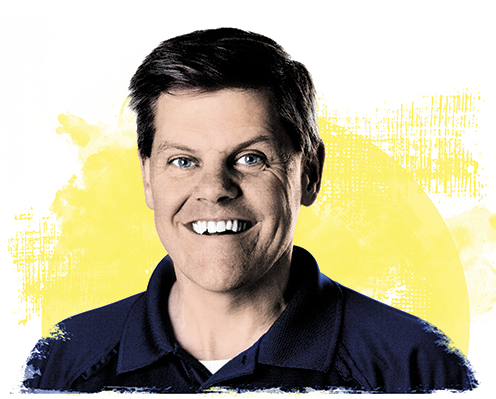American Motorcyclist June 2018
The State Of Racing
Navigating A Diverse Landscape

The American Motorcyclist Association is a complex organization that is involved in a wide variety of business activities. One of the most misunderstood aspects of the AMA is our involvement in professional motorcycle racing.
The AMA is a nonprofit membership organization with a for-profit subsidiary called Paradama, named that because when it was created, it represented a new paradigm for the AMA. Paradama, which did business as AMA Pro Racing, had its own board of directors as well as an independent CEO. In January 1995, all professional racing activity conducted by the AMA came under the control of Paradama and remained there until its board was dissolved and the Paradama CEO was dismissed in 2006. I came into my current position after this change at the end of 2006.
At that time, professional racing activities generated a lot of revenue for the AMA, but associated expenses were even greater. Not only was the AMA losing money on professional racing, but the organization had endured years of negative press and tremendous controversy due to the AMA’s management of professional racing. Much of that controversy stemmed from the AMA’s dual role as both sanctioning body and commercial race series promoter.
This is an area that is also widely misunderstood. With respect to racing, the AMA is first and foremost a motorcycle race sanctioning body. That means the AMA licenses racers and crew, approves motorcycles for competition, develops the rules of competition, provides the rulebooks that contain those rules and provides the officials who enforce those rules. The AMA also manages the adjudication process for riders who may disagree with how rules are enforced.
As a series promoter for professional motorcycle racing, the AMA had been responsible for raising sponsorship, arranging and paying for television coverage, and incurring all the other expenses associated with promoting and running various professional motorcycle racing series.
Being both the sanctioning body and series promoter created a conflict. Even the mere perception that commercial interests could affect rules enforcement degrades the integrity of the sanctioning body. Once the integrity is called into question, series sponsorship becomes less desirable and commercial value shrinks.
To address this situation, the AMA Board sought commercial partners for each of the various disciplines of professional motorcycle racing so the AMA could continue in its role as sanctioning body without the encumbrance of also being a commercial race promoter. This was working well for the AMA in the case of AMA Supercross, which served as a model to aspire to for the management of the other disciplines.
Ultimately, one group sought to acquire all of the AMA’s racing activities. In 2008, the AMA agreed to sell the rights to professional Flat Track, Road Racing, Supermoto, Hillclimb, Motocross and Supercross to the Daytona Motorsports Group.
With its newly acquired assets, DMG began doing business as AMA Pro Racing. Because DMG bought professional racing assets from the AMA rather than buy Paradama (which itself had been doing business as AMA Pro Racing), the lines between the AMA and DMG became very blurry to many.
There is even less clarity due to various changes since 2008, but allow me to shed some light with a discipline-by-discipline explanation of the current situation:
AMA Hillclimb is owned by DMG, but it is being managed by a group of hillclimb promoters under contract with DMG.
AMA Flat Track is owned and operated by DMG. In 2017, the AMA professional flat track series was rebranded as American Flat Track, which is also sanctioned by DMG, currently doing business as AMA Pro Racing.
AMA Motocross is owned by DMG but is being operated under contract with MX Sports Pro Racing, which currently serves as both the series promoter and sanctioning body, although the sanctioning is being done under the guise of AMA Pro Racing.
AMA Supercross was one of the disciplines transferred to DMG in the 2008 asset sale. However, since the AMA had a long-term contract with series promoter Feld Entertainment, which required the AMA to provide sanctioning services through 2019, it was agreed that the AMA would continue its involvement in AMA Supercross. The AMA is currently working on agreements that will keep the AMA involved in AMA Supercross for many years to come. AMA Supercross is unique in that, in addition to being sanctioned by the AMA, it is also co-sanctioned by the FIM as a world championship. Because the AMA is the sole U.S. member federation of the FIM, the AMA’s continued involvement in AMA Supercross is a practical necessity.
AMA Supermoto has reverted to the AMA by the terms of the original sale agreement because DMG elected not to conduct an AMA Pro Supermoto series. The existing AMA Supermoto National Championship Series offers a range of amateur classes, but it is not a pro series.
AMA Road Racing was owned by DMG until 2014, when the sanctioning, promotional and commercial rights to professional motorcycle road racing in America were reacquired by the AMA through a deal between DMG and the KRAVE Group, headed by AMA Motorcycle Hall of Fame Legend Wayne Rainey. The KRAVE Group owns and operates the MotoAmerica Series, sanctioned by the AMA. MotoAmerica also holds the rights to promote the AMA Superbike Championship.
AMA off-road racing in its many forms falls under the purview of the AMA. This activity has never left the AMA and continues to be a significant part of AMA racing programs.
AMA amateur racing is and always will be owned by the AMA. Amateur racing is the lifeblood of this organization.
While this summary provides an overview of the motorcycle racing landscape in America, relationships remain complex. Whether a particular discipline is owned by the AMA or another entity, be assured that the AMA remains actively involved in protecting and supporting all forms of motorcycle racin
Rob Dingman is AMA President and CEO.
